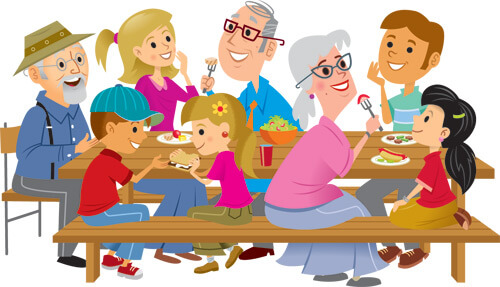
Should I Make My Kids Hug Their Relatives?
The doorbell rings at your family’s holiday celebration. Your loved ones are here, and everyone’s ready to spend a festive day as a family. After greeting your guests, you turn to your little one.
“Come give your grandparents a hug!” you say. But they refuse: your child doesn’t want to hug their relatives.
This is a story that many parents have experienced before, especially around the holidays when family gatherings are frequent. Children don’t always want to hug their relatives, especially if they’ve never met them before or they’re not as familiar with them as they are with other relatives, like their parents.
So this begs the question: what do you do when your child doesn’t want to hug their relatives?
We sat down with Kendra Moyses from Michigan State University and talked to her about what parents should do if their kids don’t want to hug their relatives.
Psst… Here’s how parents can differentiate between flu, COVID and cold symptoms.
Let’s answer the most important question off the bat: you shouldn’t force your child to hug their relatives, no matter who the relative is.
“We want to make sure that we’re not forcing kids to hug or to do physical touch with adults that they’re not comfortable with,” Moyses says.
This is especially true for relatives your child might not know as well.
“Developmentally, with young children, they have ‘stranger danger’ already, where they’re very shy of folks that they don’t know or that they’re not comfortable around,” Moyses says.
Asserting this boundary and supporting your children in this decision can be an uncomfortable conversation with some family members, but it’s not something that parents should be ashamed about.
Moyses says it can help to be upfront with family members and explain that you’re not comfortable making your child do something they don’t want to do and that you’re “making sure that they understand that they have the ability to say no.”
Letting children, especially younger children, know that they have the ability to say no is important as they’re developing a sense of their own body and boundaries to avoid sending a “mixed message,” Moyses says.
“It can be confusing if, on the one hand, we’re telling them ‘you can say no to uncomfortable physical touch,’” Moyses says. “But on the other hand, we’re telling them, ‘no, no. You have to do this even though it makes you uncomfortable.’”
This consistency is incredibly important as children continue to grow and develop.
“When you’re not there, how will they know whether or not this is something that they feel comfortable with if they haven’t been given that autonomy to decide that for themselves?” Moyses says.
How can I prepare my children to see family at the holidays?
As the holidays roll around, your kids might be meeting relatives they haven’t seen in a while or have never met, in some cases. Give them a heads up ahead of time, and talk with your child about how they’ll feel comfortable greeting these new people.
If your child doesn’t want to hug a relative, it can be helpful to present them with some alternative greetings, like handshakes, fist bumps or even just a simple “hello.” Practice these with them ahead of time in your day to day life.
“Being able to have those in your back pocket so if they don’t want to do the hug or the kiss on the cheek, they’ve got these alternatives,” Moyses says.
Should I be concerned if my child doesn’t want to hug one of their relatives?
Your child not wanting to hug a relative isn’t necessarily a red flag related to something bigger. It could be, for example, just a case of conflicting personalities.
“Maybe your child is quieter and this adult is very loud, and that just bothers them,” Moyses says.
All children are different, so it’s a matter of knowing your own child’s personality. If your child changes significantly around a certain person, it might be worth looking into.
“It’s probably a good idea to ask some questions in the privacy of your own home,” Moyses says. “And give them the opportunity to open up and share.”












